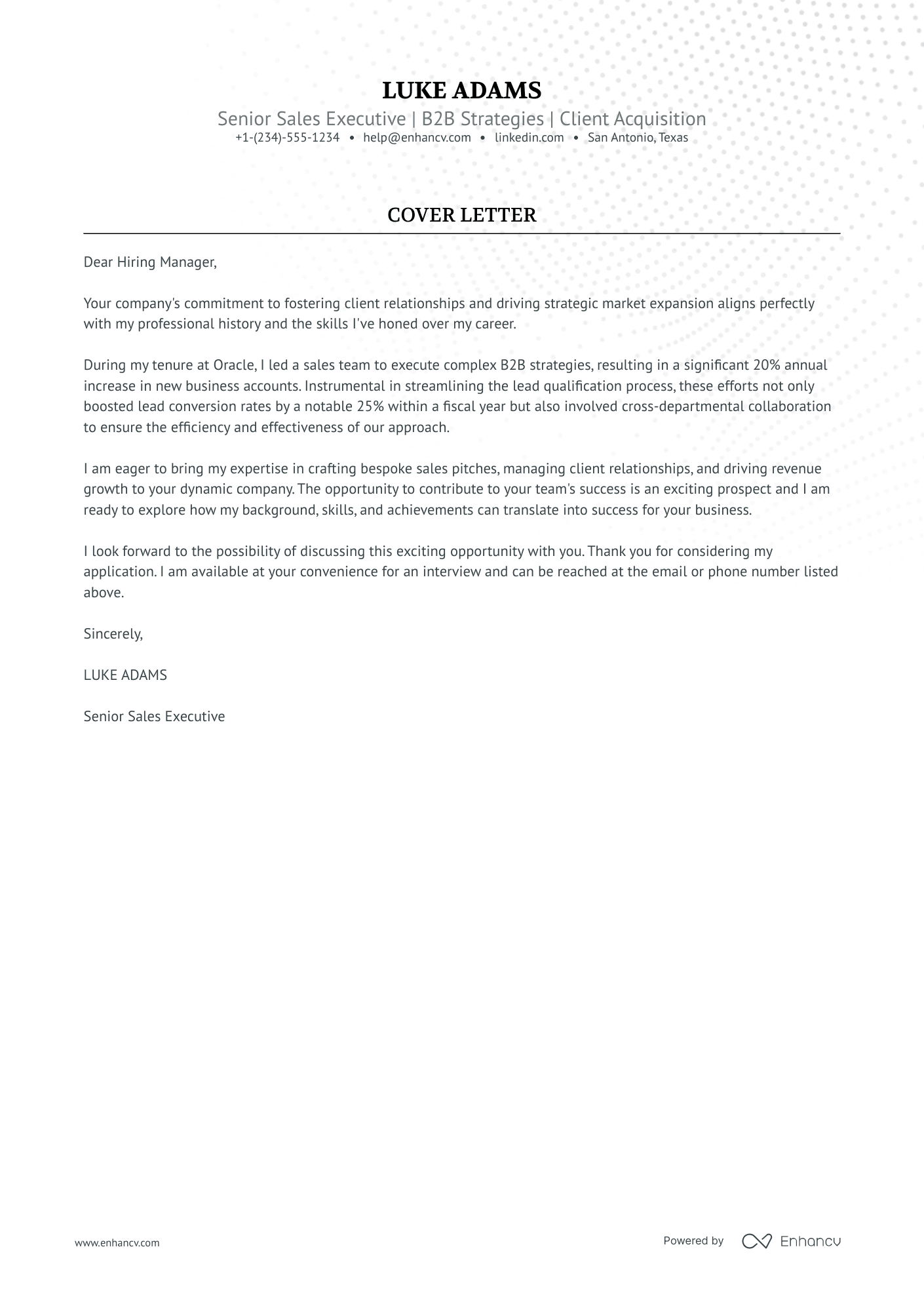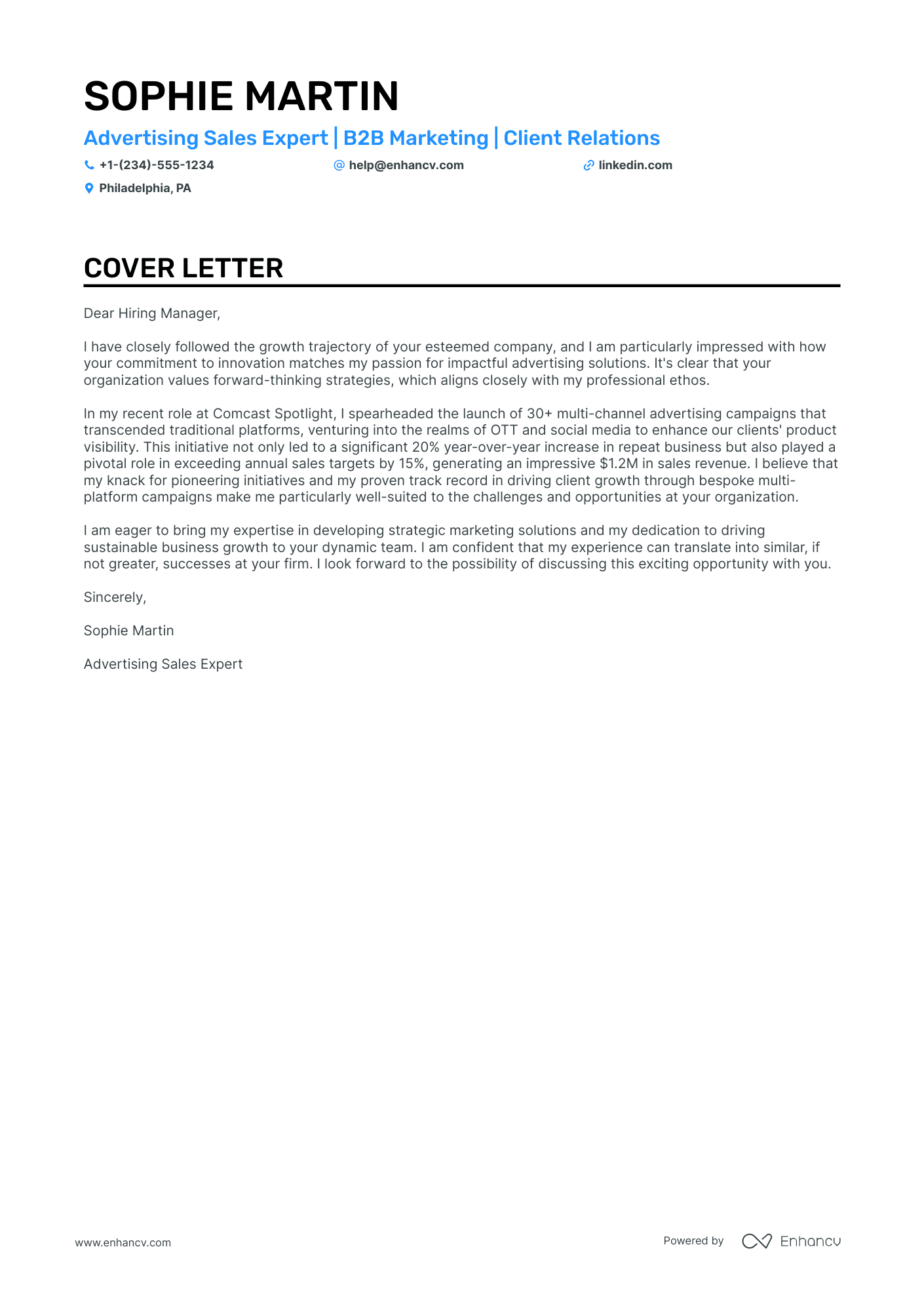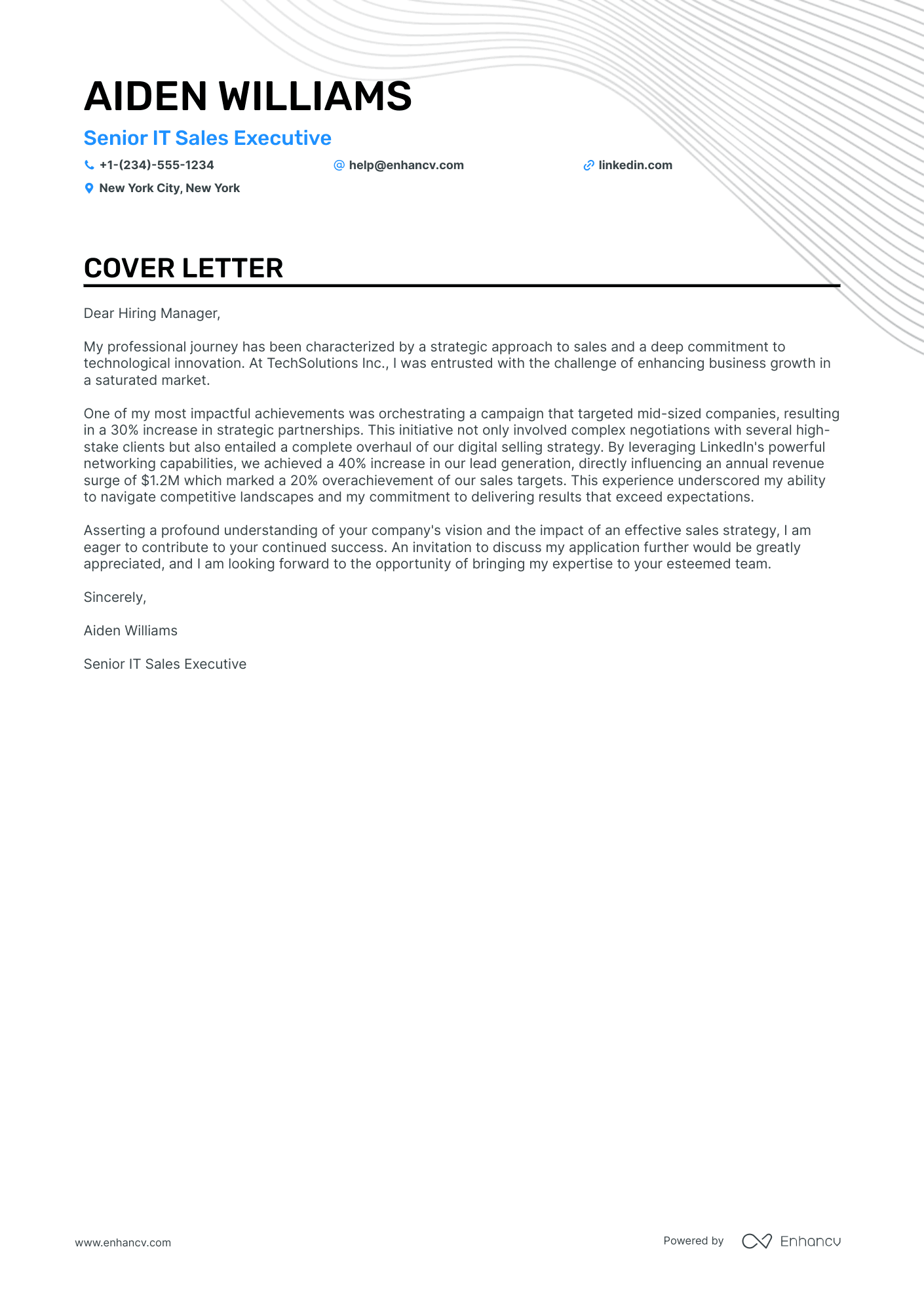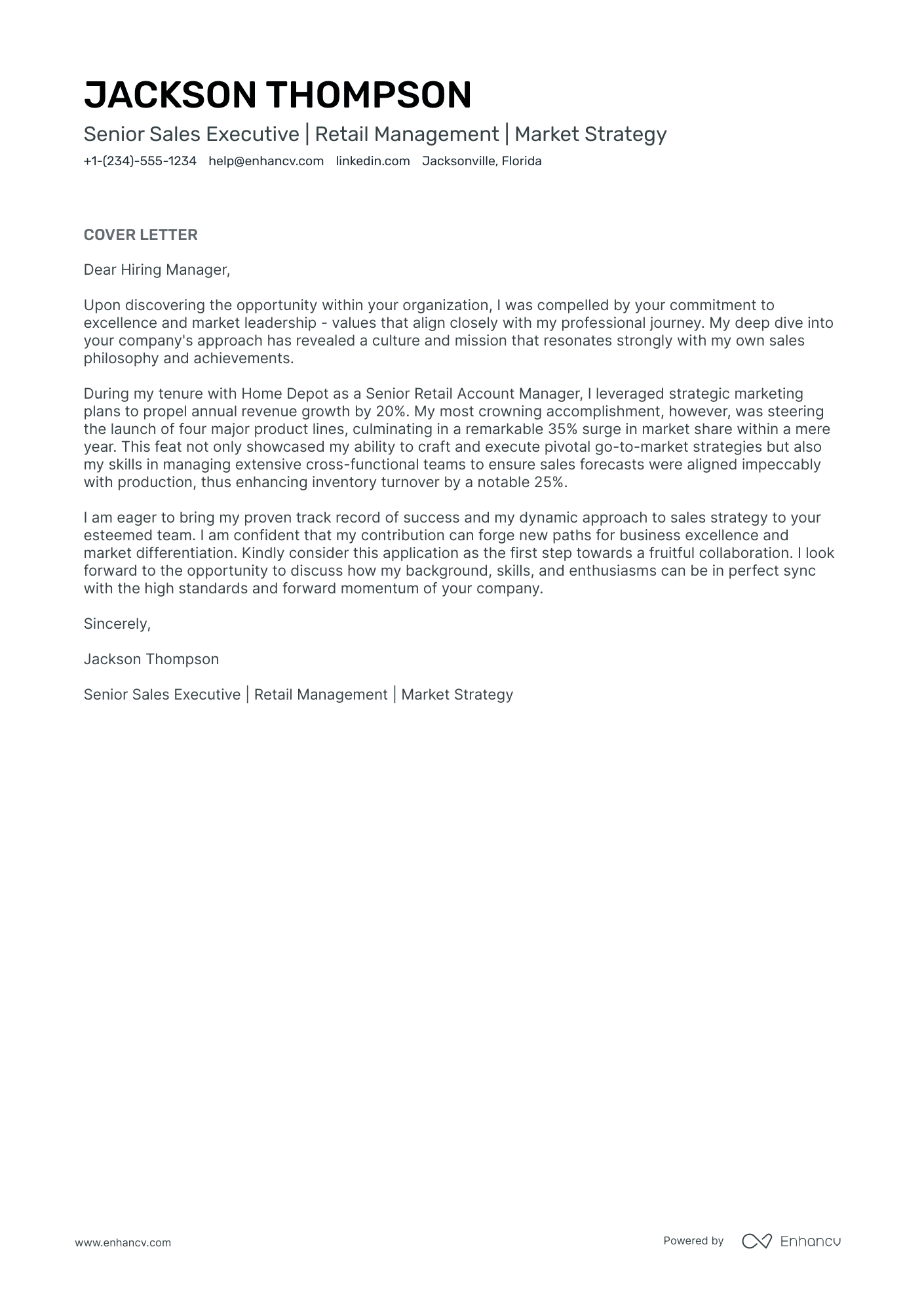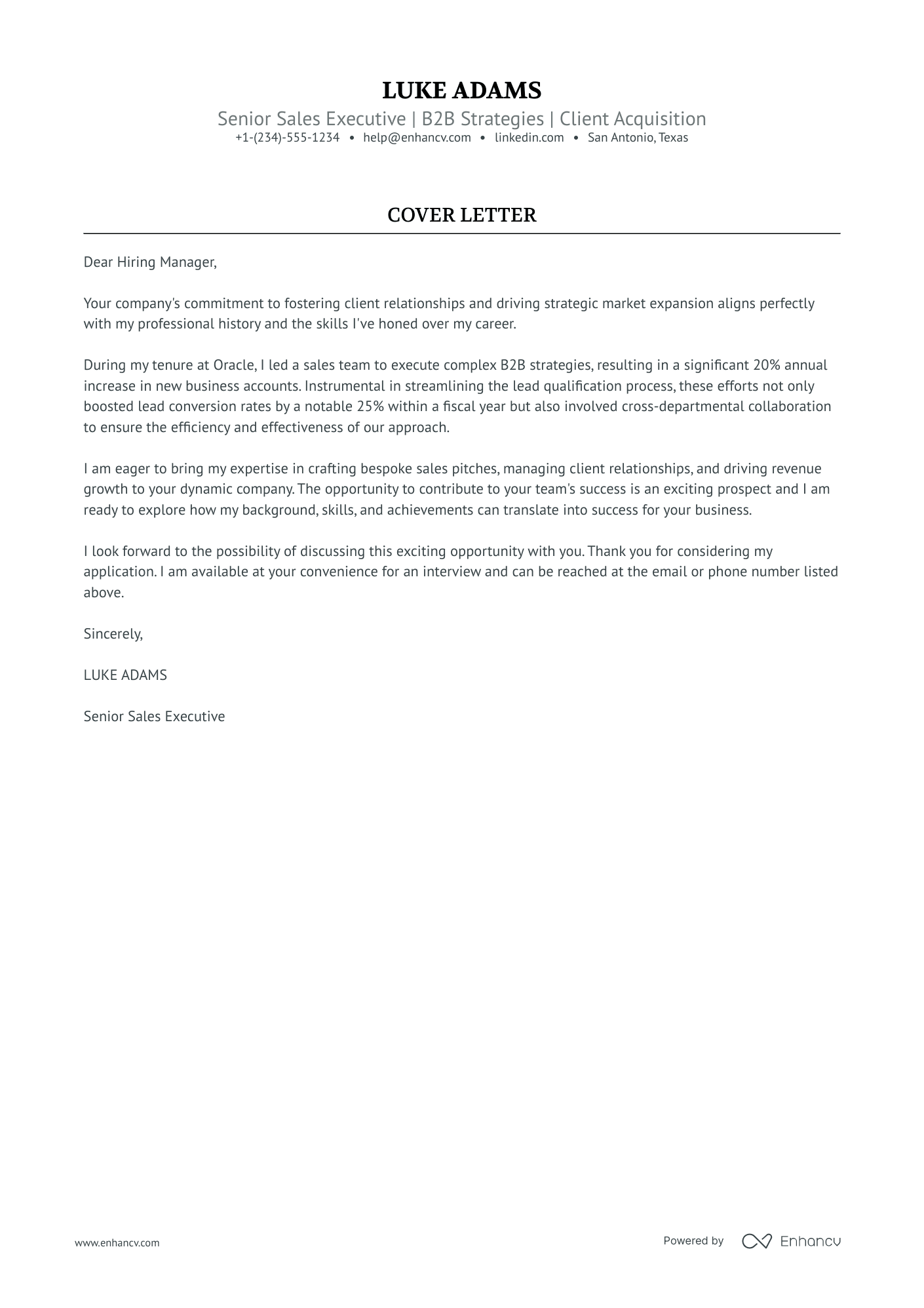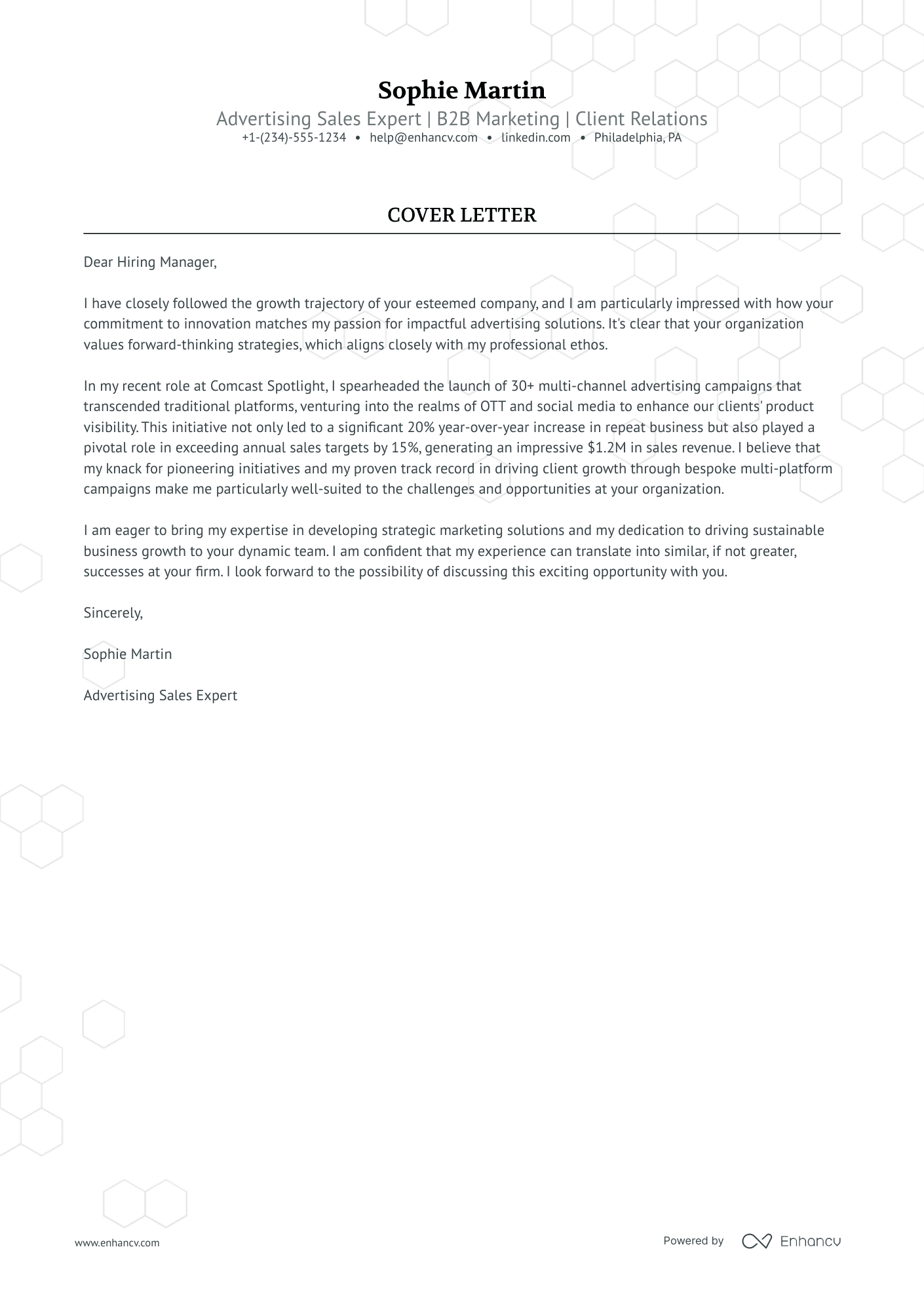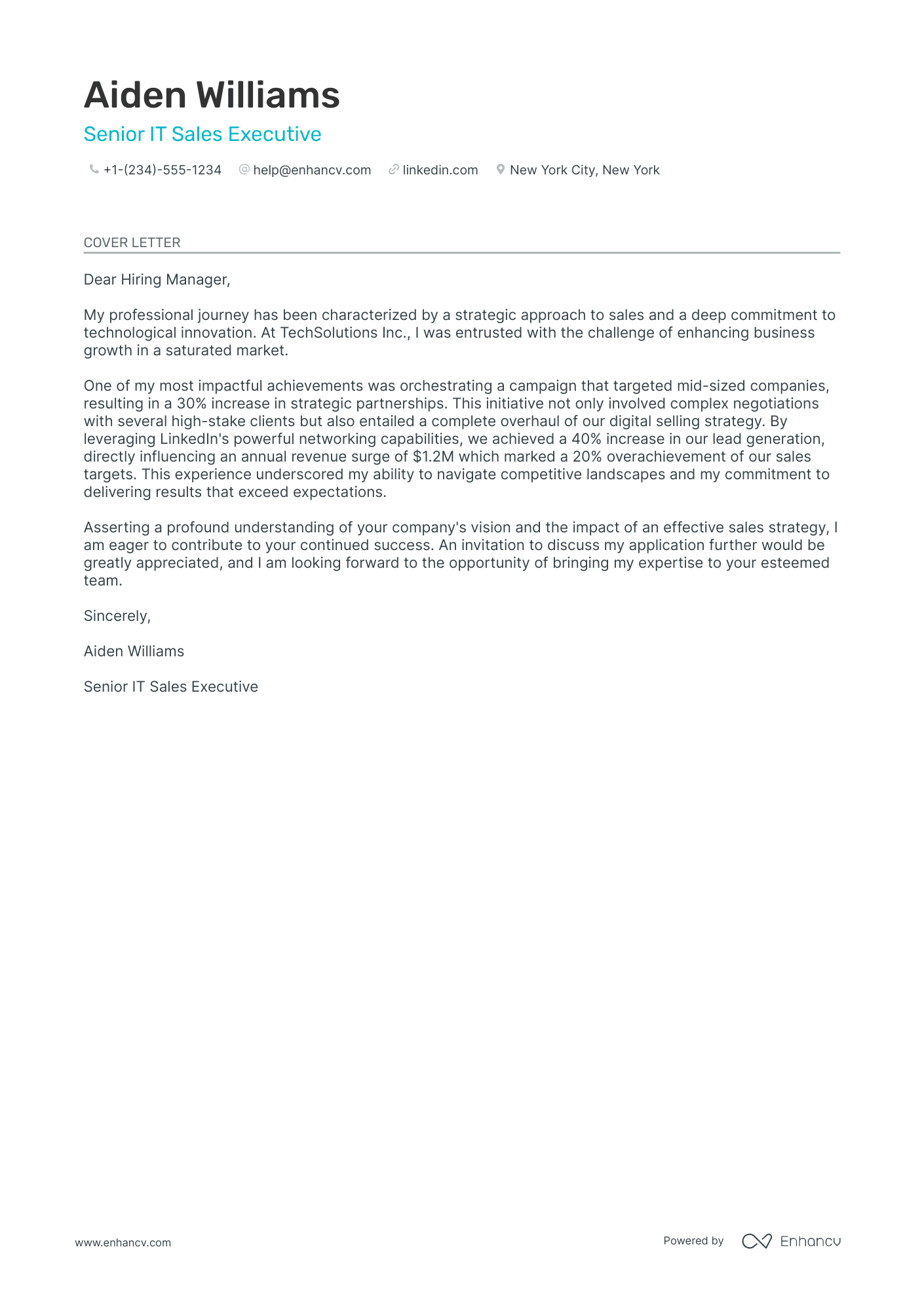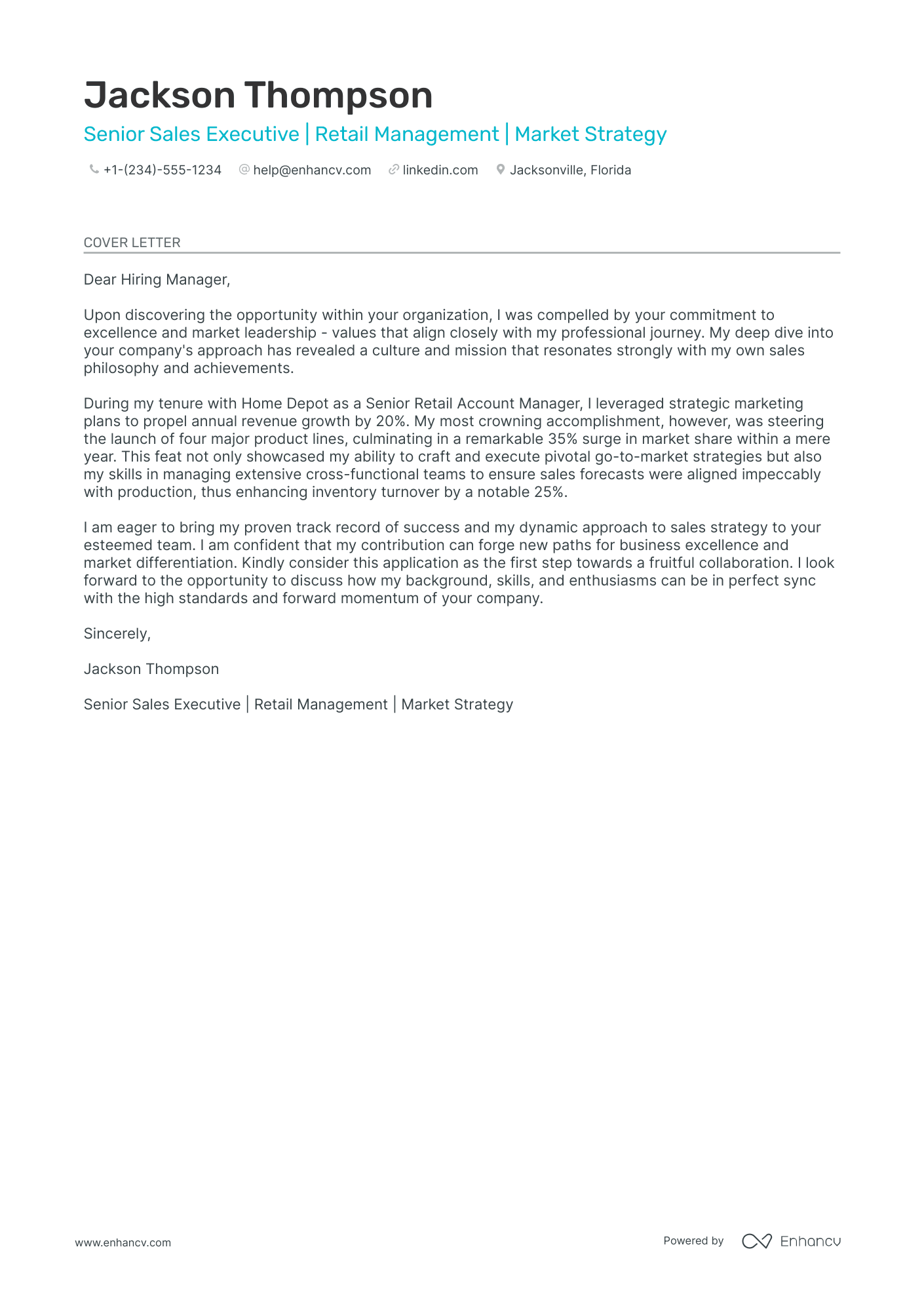Embarking on your job search, you've diligently submitted your resume only to realize a standout sales executive cover letter is also required. This isn't the place to regurgitate your resume; instead, captivate with a tale of your crowning professional achievement. Striking the right balance means being formal yet fresh, steering clear of tired clichés. Keep it concise: your cover letter's punch should fit neatly on a single page. Ready to write the letter that lands you the job? Let's dive in.
- Step your best foot forward in the sales executive cover letter introduction;
- Be inspired by other professionals' certified cover letters;
- Structure your sales executive cover letter to feature what matters most;
- Close off your sales executive cover letter to make a memorable impression on recruiters.
But where to start writing? Upload your resume into Enhancv's AI, which will prepare your sales executive cover letter (all you need to do is personalize it, and you'll be good to go).
If the sales executive isn't exactly the one you're looking for we have a plethora of cover letter examples for jobs like this one:
- Sales Executive resume guide and example
- Lead Generation cover letter example
- Fragrance Sales Associate cover letter example
- Sales Representative cover letter example
- Customer Service cover letter example
- Travel Consultant cover letter example
- Grocery Store Cashier cover letter example
- Call Center Representative cover letter example
- Sales Support Coordinator cover letter example
- Sales Intern cover letter example
- District Sales Manager cover letter example
Drop your resume here or choose a file.
PDF & DOCX only. Max 2MB file size.
Sales executive cover letter example
Luke Adams
Dallas, TX
+1-(234)-555-1234
help@enhancv.com
- Alignment with Company Goals: Emphasizing the alignment of personal goals and experience with the company's objectives is crucial. This demonstrates an understanding of the company's vision and the potential for a mutually beneficial relationship.
- Demonstrated Results: Providing clear, quantifiable achievements (like a 40% sales increase in a new territory) illustrates the candidate's ability to deliver results, which can be a persuasive argument for their candidacy.
- Relevant Experience: Drawing attention to specific skills and experiences pertinent to the job, such as CRM system implementation and market analysis, can showcase the candidate's proficiency and readiness to contribute effectively to the role.
What are the basics of the design or format of your sales executive cover letter?
To start, here's a reminder for you: the Applicant Tracker System (or software that is used to assess candidate profiles), won't be reading your sales executive cover letter.
Recruiters enjoy reading sales executive cover letters with a standardized format that uses:
- the same font as the resume (e.g. modern ones like Raleway or Volkhov are prefered over the clichéd Times New Roman or Arial);
- single spacing to keep the content concise and organized (this is all ready for you in our cover letter templates);
- a one-inch margin to wrap around the text, like in our cover letter builder;
- PDF as a file format, as it allows your design (and visual element) to stay the same.
Finally, we can't go on without mentioning the key sections of your sales executive cover letter.
In the top one-third, make sure to include a header (with your contact information, name, role, and date), a salutation, and an introduction.
Next, follows the heart and soul of your sales executive cover letter or its body.
End your sales executive cover letter with a closing paragraph and, if you wish, a signature.
Don’t stress about writing your cover letter. Use our free cover letter generator to make one in seconds.
The top sections on a sales executive cover letter
- Header: This includes your name, address, phone number, email address, and the date, ensuring the recruiter knows how to contact you and lends a professional look to your cover letter.
- Greeting: Addressing the recruiter or hiring manager by name shows that you have done your research and are genuinely interested in the company, establishing a personal connection from the beginning.
- Introduction: Here you briefly introduce yourself, express your interest in the sales executive position, and mention how you heard about the job opening, which indicates your active interest and engagement in your job search.
- Sales Pitch/Body: This section should highlight your key sales achievements, relevant experiences, and how your skills match the job requirements, essentially "selling" yourself for the role in the same way you would sell a product or service.
- Closing & Call to Action: Conclude by reaffirming your interest in the position, proposing the next steps, such as an interview, and thanking the reader for considering your application, prompting them to move forward with your candidacy.
Key qualities recruiters search for in a candidate’s cover letter
- Strong communication skills: Essential for effectively pitching products or services to clients and maintaining relationships.
- Proven sales track record: Demonstrates success in meeting or exceeding sales targets, indicating potential future performance.
- Negotiation expertise: Critical for closing deals and maximizing revenue while maintaining customer satisfaction.
- Adaptability and resilience: Sales environments are dynamic; the ability to cope with rejection and adapt strategies is key.
- Relationship-building abilities: Long-term client relationships are vital for recurring business and referrals.
- Industry knowledge: Understanding the market, competitors, and product details to convincingly argue the value proposition.
Personalizing your sales executive cover letter salutation
Always aim to address the recruiter from the get-go of your sales executive cover letter.
Use:
- the friendly tone (e.g. "Dear Paul" or "Dear Caroline") - if you've previously chatted up with them on social media and are on a first-name basis;
- the formal tone (e.g. "Dear Ms. Gibbs" or "Dear Ms. Swift") - if you haven't had any previous conversation with them and have discovered the name of the recruiter on LinkedIn or the company website;
- the polite tone (e.g. "Dear Hiring Manager" or "Dear HR Team") - at all costs aim to avoid the "To whom it may concern" or "Dear Sir/Madam", as both greetings are very old-school and vague.
List of salutations you can use
- Dear Hiring Manager,
- Dear [Recipient's Name],
- Dear [Department] Team,
- Dear [Company Name] Recruiter,
- Dear Mr./Ms. [Last Name],
- Dear [Job Title] Search Committee,
Your sales executive cover letter intro: showing your interest in the role
On to the actual content of your sales executive cover letter and the introductory paragraph.
The intro should be no more than two sentences long and presents you in the best light possible.
Use your sales executive cover letter introduction to prove exactly what interests you in the role or organization. Is it the:
- Company culture;
- Growth opportunities;
- Projects and awards the team worked on/won in the past year;
- Specific technologies the department uses.
When writing your sales executive cover letter intro, be precise and sound enthusiastic about the role.
Your introduction should hint to recruiters that you're excited about the opportunity and that you possess an array of soft skills, e.g. motivation, determination, work ethic, etc.
What to write in the body of your sales executive cover letter
Now that you've got your intro covered, here comes the heart and soul of your sales executive cover letter.
It's time to write the middle or body paragraphs. This is the space where you talk about your relevant talent in terms of hard skills (or technologies) and soft (or people and communication) skills.
Keep in mind that the cover letter has a different purpose from your sales executive resume.
Yes, you still have to be able to show recruiters what makes your experience unique (and applicable) to the role.
But, instead of just listing skills, aim to tell a story of your one, greatest accomplishment.
Select your achievement that:
- covers job-crucial skills;
- can be measured with tangible metrics;
- shows you in the best light.
Use the next three to six paragraphs to detail what this success has taught you, and also to sell your profile.
Final words: writing your sales executive cover letter closing paragraph
The final paragraph of your sales executive cover letter allows you that one final chance to make a great first impression.
Instead of going straight to the "sincerely yours" ending, you can back up your skills with a promise of:
- how you see yourself growing into the role;
- the unique skills you'd bring to the organization.
Whatever you choose, always be specific (and remember to uphold your promise, once you land the role).
If this option doesn't seem that appealing to you, close off your sales executive cover letter with a follow-up request.
You could even provide your availability for interviews so that the recruiters would be able to easily arrange your first meeting.
Keep this in mind when writing your zero experience sales executive cover letter
Even though you may not have any professional experience, your sales executive cover letter should focus on your value.
As a candidate for the particular role, what sort of skills do you bring about? Perhaps you're an apt leader and communicator, or have the ability to analyze situations from different perspectives.
Select one key achievement from your life, outside work, and narrate a story that sells your abilities in the best light.
If you really can't think of any relevant success, you could also paint the picture of how you see your professional future developing in the next five years, as part of the company.
Key takeaways
We hope this sales executive cover letter writing guide has shown you how to:
- Format your sales executive cover letter with the mandatory sections (e.g. header, greeting, intro, body, and closing) and select the right font (P.S. It should be the same as the one you've used for your resume);
- Substitute your lack of professional experience with your most noteworthy achievement, outside of work, or your dreams and passions;
- Ensure recruiters have a more personalized experience by tailoring your cover letter not just to the role, but to them (e.g. writing their first/last name in the salutation, etc.);
- Introducing your biggest achievement and the skills it has taught you in your sales executive cover letter body;
- Write no more than two sentences in your sales executive cover letter introduction to set the right tone from the get-go.
Sales Executive cover letter examples
By Experience
Senior Sales Executive
By Role
